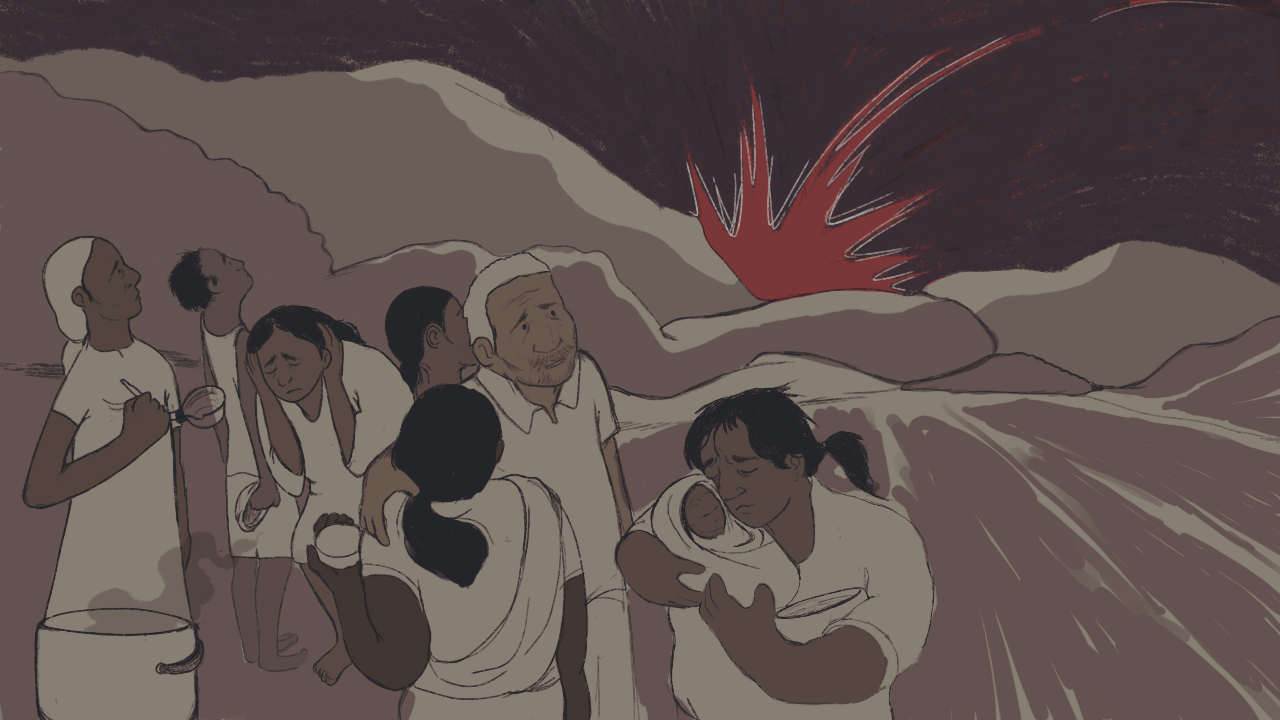 by People for Equality and Relief in Lanka, Washington, DC
by People for Equality and Relief in Lanka, Washington, DC
Full report: Justice-for-Genocide-Sri-Lankas-Responsibility-for-Genocide-Against-the-Tamil-People-in-2009
For Immediate Release
Comprehensive Legal Analysis Urges Genocide Recognition
(Geneva, September 9, 2024)– The Sri Lankan government and military committed genocide
against the Tamil people in 2009, People for Equality and Relief in Lanka (PEARL) said in a
legal briefing paper released today. The paper was released at the start of the UN Human
Rights Council’s 57th session, during which the UN human rights chief will present the latest
report of accountability options for Sri Lanka.
“The Sri Lankan government cloaked its horrific atrocities in the language of ‘counter-terrorism’
and paved the way for similar genocidal acts to occur, including in Gaza,” said Madura
Rasaratnam, Executive Director of PEARL. “This report urges members of the international
community to listen to Tamils, who’ve rightly said ‘genocide’ for over 15 years, and to formally
recognize Sri Lanka’s genocide against the Tamil people in 2009.”

The report, “Justice for Genocide: Sri Lanka’s Responsibility for Genocide against the Tamil
People in 2009,” undertakes the most comprehensive evidentiary and legal analysis to date of
the Sri Lankan government and military’s conduct as genocidal acts that were committed with
genocidal intent. It concludes Sri Lanka is responsible for genocide against the Tamil people
from January through May 18, 2009.
During these final months of the war, the Sri Lankan military deliberately shelled
government-designated “No Fire Zones,” killing at least 40,000 Tamil civilians, severely injuring
another 25,000 to 30,000 Tamils, and attacking hospitals, food distribution lines, and other
humanitarian objects. Soldiers raped and sexually mutilated many Tamil women and girls, and
security forces physically and sexually tortured countless Tamil men and women detainees. The
government deliberately restricted access to necessary food and medical supplies in the war
zone and created inhumane conditions for internally displaced Tamils in de facto internment
camps. While UN investigations found such conduct may constitute war crimes and crimes
against humanity, they have remained silent on genocide allegations and investigations,
prosecutions, and recognition thereof. This is despite ample circumstantial evidence, which
international criminal courts and the International Court of Justice have relied on in their
genocide judgments.
Using factual evidence from UN investigations, international NGOs, and the media, PEARL
applied genocide jurisprudence, including on appropriate circumstantial evidence, and found the
Sri Lankan government and its forces’ conduct constituted at least one of the following three
genocidal acts: killing, causing serious bodily or mental harm, and/or deliberately inflicting
conditions of life calculated to bring about their partial physical destruction.
These genocidal acts were committed with the intent to destroy the Tamils in the Vanni region,
the last area under the control of the Liberation Tigers of Tamil Eelam (LTTE). PEARL
determined Sri Lanka’s intent to destroy based on the deployment of at least 14 times as many
soldiers and special forces as LTTE “core fighters” in the Vanni; consistent, methodical conduct
against Tamils in the Vanni; and deliberately disproportionate attacks in the Vanni, knowing the
vast majority of Tamils were civilians who did not pose a serious military threat.
PEARL also analyzed Sri Lankan officials’ statements conflating and explicitly reframing the
civilian population as LTTE combatants in an attempt to conceal the genocide under the guise of
the escalating internal armed conflict, counterinsurgency, and the global “war on terror.” Of the
alleged perpetrators most responsible, then-Defense Secretary Gotabaya Rajapaksa said that
“only LTTE sympathizers” were present in the “No Fire Zone”; “to crush the terrorists, there is
nothing called unproportionate”; and the UN should refer to the dead as “people,” not “civilians,”
all of which indicate an intent to destroy the Tamils in the Vanni.
Formal recognition of a state’s responsibility for genocide by policymakers does not attach legal
consequences. However, it is an important measure of accountability in its own right, especially
in the face of impunity. Genocide recognition is also critical given the ongoing human rights
violations and persecution of Tamils in the Vanni today who have lived under a military
occupation that enables arbitrary arrests and detention, enforced disappearances, torture,
sexual violence, repression of the right to memorialize, land grabs, and displacement.
Governments should carry out genocide determinations and apply national and universal
jurisdiction to investigate allegations of all international crimes. Policymakers should formally
recognize that Sri Lanka is responsible for genocide against the Tamil people in 2009 and call
for the establishment of an international criminal justice mechanism to investigate alleged Sri
Lankan perpetrators of all international crimes and prosecute those most responsible. UN
entities should expressly consider genocide allegations in their analyses of evidence.
“Tamils in the Vanni today face not only human rights violations and persecution, but also
surveillance, harassment, and intimidation, particularly those bravely demanding justice and
accountability for 2009, like the Tamil Families of the Disappeared,” Rasaratnam said. “As long
as impunity reigns, facilitating militarization and abuses, Tamils in the Vanni will not have
sustainable peace. The state of Sri Lanka and Sri Lankan war criminals and genocidaires must
be brought to justice.”
For more PEARL reporting on Sri Lanka, please visit: https://pearlaction.org/
For more information, please contact:
Madura Rasaratnam at